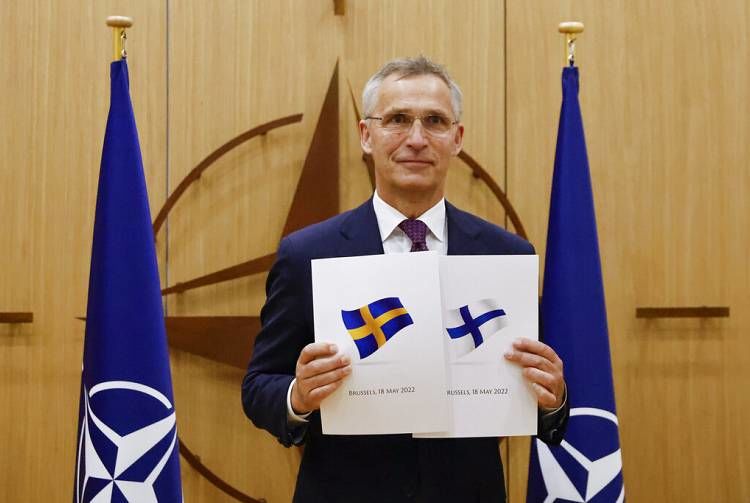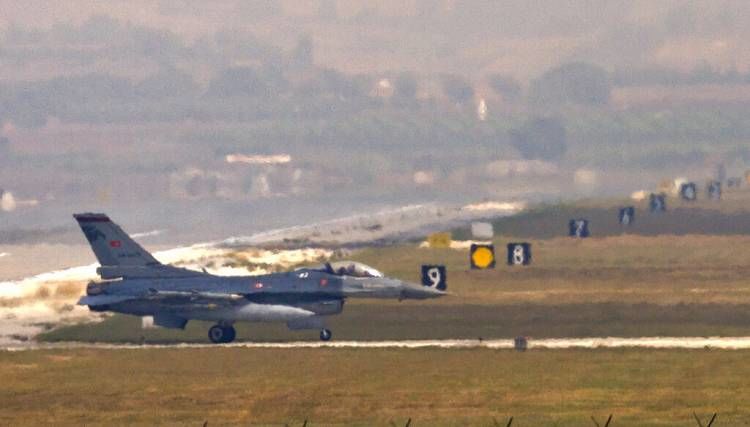
Hungary and Turkey still blocking Finland and Sweden joining NATO
After just three months, 28 out of 30 NATO states have ratified the treaty changes in their national parliaments that would approve membership for Finland and Sweden; while 24 nations have already deposited the new paperwork in Washington.
But there are two reasons why Nordic champagne corks aren't popping quite yet: Hungary and Turkey.
In September the Finnish foreign minister said his Hungarian counterpart had promised to proceed with the ratification and assured the Finns there were no objections to Finland or Sweden's accession.
A few weeks earlier at the end of August, Hungary's Minister for Regional Development (and former EU Commissioner) Tibor Navracsics visited Helsinki and told Finnish MPs that his country would ratify their NATO membership application without delay.
"Hungary supports Finland’s NATO membership, but the ratification process in the Hungarian parliament is still under way," a Finnish government press release noted at the time.
This week, however, Viktor Orbán's Fidesz politicians blocked the introduction of a motion in parliament that would have speeded up a vote on the NATO accession process for both Finland and Sweden, in a move that drew sharp criticism from the opposition.
"This is an incomprehensible and unjustified decision," said Bertalan Tóth, the Hungarian MP who tried to introduce the motion.
"Finland and Sweden are committed partners of NATO, have been involved in the Alliance's Partnership for Peace programme since 1994 and have played and are playing an active role in past and present NATO-led peace support operations," he added.
The discussion of the accession process is still on the Hungarian parliament schedule, in theory. However, no date has been set which means, for the time being, the issue is on the back burner.
What are the reasons Hungary is stalling?
Despite previous reassurances to the Nordic applicants, there are likely to be three main reasons the Hungarians have now put the brakes on ratifying their accession process, according to Péter Krekó at the Political Capital think tank in Budapest.
"Firstly, Hungary is the most pro-Turkey EU member state, they have stood up for Erdogan on a number of issues, they are in favour of Turkish EU accession, and they have stressed that Turkey's concerns about Swedish and Finnish NATO membership should be taken into account," he told Euronews.
The other main reason, according to Krekó, is that Hungary is in an isolated position within the EU, "so the veto is the tool it uses to assert its influence".
"Hungary gives nothing for free", he added, "it shows that it has leverage in the EU, and is even willing to link a NATO-related decision to EU processes".
The third likely reason is that Hungary is also "the most Russian-friendly government in the EU".
Leading Russian politicians have recently praised the Orbán government for its "independent policy," including a new deal to buy gas from Russia.
"If anyone clearly likes the postponement of Swedish and Finnish NATO membership, it is clearly Russia", a country on which the Hungarian government has developed a relationship of dependence, for example in the field of energy," said Krekó.

What does this mean for Finland and Sweden?
Behind the scenes in Helsinki and Stockholm, there will be a certain degree of frustration among ministers and officials, thinking they've come so far, so fast with NATO membership, only to be blocked at the last hurdles.
So is there anything that either country can do to bring more pressure on Viktor Orbán and his government?
"There may not be much Finland can do about this," said Minna Ålander, a researcher at the Finnish Institute of International Affairs in Helsinki.
"Possibly Fidesz hopes to link Finland and Sweden’s NATO membership to the recent EU commission proposal to freeze funds for Hungary due to rule of law concerns," she told Euronews.
"However in this case it looks like Orban is just joining the Turkish bandwagon when it comes to Finnish and Swedish NATO membership. As long as Erdogan keeps announcing that he’ll keep blocking their accession, as he did a couple of days ago, Hungary is unlikely to move either," Ålander said.
So what's the deal with Turkey?
Turkey's case for stalling on NATO membership for Finland and Sweden is more complex than Hungary's, and there are new indications that President Erdogan might be inclined to let Finland's process continue, but hold up Sweden's.
The Turks had originally signalled that they supported the NATO bids: in a phone call between President Erdogan and President Niinistö at the beginning of April, the Finns received assurances that there wouldn't be any problems.
But just a month later and Turkey had backtracked, coming up with a laundry list of reasons why the two Nordic nations couldn't join NATO, including supposed support for groups that Ankara considers terrorist organisations.
Fast forward another month to the NATO summit in Madrid at the end of June, and after some intensive closed-door diplomacy, Turkey reached an agreement to support the memberships - including setting up tripartite talks to smooth over any sticking points.
Those discussions began in Finland in August and were expected to continue in the autumn, but at the start of the month, Erdogan had put the brakes on approving the bids - again.
At the opening of parliament in Ankara on 1 October, he told legislators that if Finland and Sweden don't live up to "promises" they made to Turkey on security and terrorism, then he would block their membership bids.
"We will maintain our principled and determined stance on this issue until the promises made to our country are kept," Erdogan said.
Another fly in the ointment is Turkish ire at a satirical news show on Swedish public broadcaster SVT, which poked fun at Erdogan. The Swedish ambassador in Ankara has been summoned for a dressing-down, and the timing is far from ideal.
"Formally it is up to the Turkish parliament to decide on Sweden's NATO application, but in the end it is Erdogan who decides - and he is an emotional person who can absolutely choose to punish a counterpart if he feels offended," Paul Levin, director of the Institute for Turkish Studies at the University of Stockholm told the Swedish News Agency TT.

Ankara's military shopping list comes into play
Turkey is still hoping for a green light to buy US F-16 fighters - and they might be looking to use the Finland and Sweden NATO decision as a way to pressure the Americans to approve a deal (a senior Turkish military commander said recently if there was no F-16 deal, Turkey could buy new warplanes from Russia instead).
"Turkey’s strategic interests have increasingly diverged from the rest of the [NATO] alliance," said Toni Alaranta, a Turkey specialist at the Finnish Institute of International Affairs, in a recent briefing paper.
"It is hard to escape the conclusion that the country's foreign policy elites are extremely doubtful whether it is ultimately in Turkey's interest to support NATO expansion at a time when Turkey is determinedly trying to continue its balancing policy between the West and Russia," Dr Alaranta wrote.
He also said it could be argued that Turkey sees more Nordic NATO memberships as a potentially disruptive element, "further straining the West-Russia relationship".
However, he concluded that Turkey will eventually approve Finland's and Sweden's membership.
It might simply be a matter of time and leverage.











